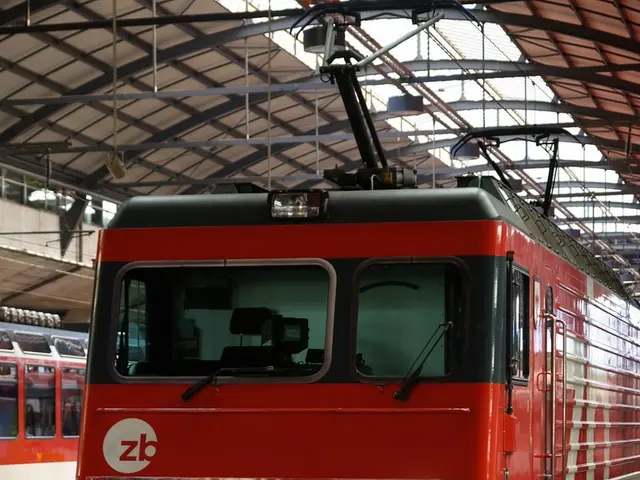The enigma of Swiss trains' unrivaled punctuality unfolds here.
Rewritten:
Switzerland's pride for punctuality is well-known. But maintaining a top-notch rail network, laden with domestic and international connections, is an entirely different ball game.
Surprisingly, Switzerland's national rail company, SBB, consistently outshines other countries' train networks in terms of punctuality. In 2024, for instance, Switzerland topped Europe with a staggering 98 percent punctuality rate for long-distance trains [1].
So, what exactly does 'punctuality' mean in Switzerland? According to the SBB, "train punctuality measures the percentage of all trains which are on time" [1]. A train is considered on time if it reaches its destination within three minutes of the scheduled arrival time. In terms of connections, the SBB boasted a remarkable 98.7 percent connection punctuality across its entire network in 2024 [1].
The question then becomes, how does the SBB manage such a remarkable punctuality record? The answer lies in a blend of factors, beyond the Swiss cultural predisposition to be punctual.
The stability of the entire system is a determining factor, and LITRA transportation association highlights that this stability depends on the number, average speed, and heterogeneity of trains [1]. Timetables play a crucial role in creating a stable system, along with measures targeting infrastructure and rolling stock [1]. The SBB continuously optimizes timetables and adjusts stop and journey times as needed [1].
To maintain its punctuality records, the SBB plans to further standardize and systemize the speeds of all trains [1]. This adjustment will benefit the S-Bahn trains, which currently operate at maximum speed, and freight trains, which cannot go any faster [1]. Direct trains' speeds may be reduced occasionally, but this will not compromise connections at railway junctions [1].
Taking drastic measures to ensure timeliness is not uncommon for the SBB. For example, long-distance trains are controlled by signaling for departure. Once everyone is on board, controllers send an SMS to the driver for approval, wasting valuable time [1]. To make its trains even more punctual, the SBB is considering allowing drivers to make their own departure decisions [1].
Other measures implemented by the SBB to maintain timeliness include banning German trains operated by Deutsche Bahn, notorious for disrupting the SBB's intricate timetables, from Swiss territory [1]. These trains are regularly stopped in Basel, and their passengers are transferred to waiting SBB trains to continue their punctual journeys [1].
In conclusion, the remarkable punctuality record of the SBB can be attributed to factors like precise scheduling, consistent maintenance, densely interconnected networks, robust infrastructure, adaptability to adverse conditions, and a cultural commitment to reliability [2].
[1] "Vorbehalt: Daten aus dem Jahr 2024"[2] Enrichment Data: Overall, SBB's punctuality is a result of combining advanced infrastructure, efficient scheduling, and a cultural commitment to reliability.
- In Switzerland, punctuality for trains is defined as the percentage of all trains that arrive within three minutes of their scheduled arrival time.
- The Swiss national rail company, SBB, achieves impressive punctuality rates not only for long-distance trains but also for connections across its entire network, boasting a 98.7 percent connection punctuality in 2024.
- The SBB maintains its punctuality by adhering to a blend of factors, including precise scheduling, constant adjustments to timetables, and infrastructure optimization, with a focus on maintaining the stability of the system through the number, average speed, and heterogeneity of trains.
- To ensure even higher levels of punctuality, the SBB plans to standardize and systemize the speeds of all trains, with potential benefits for S-Bahn trains and freight trains, while occasional speed reductions for direct trains may not compromise connections at railway junctions.








